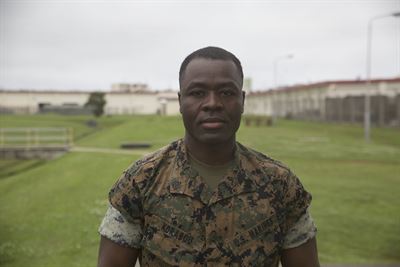 Marine Corps Sgt. Doudoubite Korabou, a mechanic with the 7th Communication Battalion in Okinawa, Japan, served as the chief instructor at III Marine Expeditionary Force Headquarters Group’s corporals’ course. Marine Corps photo by Lance Cpl. Kelsey DornfeldOKINAWA, Japan, April 25, 2016 — After hearing he had been assigned to the position of chief instructor at the III Marine Expeditionary Force Headquarters Group corporals’ course, Marine Corps Sgt. Doudoubite Korabou said his initial thought was, “The shop doesn’t want me; they’re trying to get rid of me.”Only later did he learn that his senior enlisted leaders had selected him as the most qualified Marine to represent the 7th Communication Battalion during the course.Korabou emigrated from Africa to the United States in July 2006. He said his life was not easy once he got to America because he had no knowledge of the culture and only spoke French. He had studied three years of pharmacy before emigrating, and he finished a four-year degree in public health after he arrived in the U.S.In January 2008, with limited knowledge of the Marine Corps, Korabou enlisted as an automotive maintenance technician. Since then, his language skills have improved dramatically, he said.
Marine Corps Sgt. Doudoubite Korabou, a mechanic with the 7th Communication Battalion in Okinawa, Japan, served as the chief instructor at III Marine Expeditionary Force Headquarters Group’s corporals’ course. Marine Corps photo by Lance Cpl. Kelsey DornfeldOKINAWA, Japan, April 25, 2016 — After hearing he had been assigned to the position of chief instructor at the III Marine Expeditionary Force Headquarters Group corporals’ course, Marine Corps Sgt. Doudoubite Korabou said his initial thought was, “The shop doesn’t want me; they’re trying to get rid of me.”Only later did he learn that his senior enlisted leaders had selected him as the most qualified Marine to represent the 7th Communication Battalion during the course.Korabou emigrated from Africa to the United States in July 2006. He said his life was not easy once he got to America because he had no knowledge of the culture and only spoke French. He had studied three years of pharmacy before emigrating, and he finished a four-year degree in public health after he arrived in the U.S.In January 2008, with limited knowledge of the Marine Corps, Korabou enlisted as an automotive maintenance technician. Since then, his language skills have improved dramatically, he said.
New Responsibilities
Korabou’s assignment with the corporals’ course was a world away from his typical day as a maintenance technician: ensuring Marine Corps trucks are “ready for mission.”The sergeant was responsible for all administrative matters throughout the course, teaching classes, providing knowledge and demonstrating leadership to his subordinates.One day, as Korabou ran up a hill during a physical training session he looked behind and realized many of his Marines were falling behind. He reached the top and ran back down to motivate them, until they were caught up with the rest. He then sprinted back to the front of the formation, ready for the next hill.“We’re never going to ask them to do something that we wouldn’t do ourselves,” he said in a heavy African French accent.
Physical, Mental Fitness
Korabou said he believes being physically fit is a critical part of a healthy lifestyle. During the weekends he practices Judo in town with his Okinawa friends. He grew up practicing many martial arts in many parts of Africa and was excited to come to Japan, where Judo originated.Korabu said he incorporates the mental and moral aspects of Judo into the leadership techniques he uses in the corporals’ course. Judo is very humbling, he said. Students learn to respect coaches, peers and less-skilled students, Korabou said, explaining that he teaches his students in the corporals’ course the same thing.One way of showing respect is demonstrated when a Marine needs to be corrected, he said. Korabou said there’s no need to go up to them “guns blazing” and “knife-handing,” but instead to assess the situation carefully and fix the issue professionally and with respect.
First Impressions
Korabou is attentive to detail, especially in appearance. His utilities uniform is ironed and crisp. In classes, he teaches that wearing the Marine Corps uniform should generate pride. Looking sharp is important simply to respect the Marines that previously wore the uniform, he said.“I truly believe that appearance is the first impression that you have on individuals around you,” Korabou said. “Appearance just says a lot about a person; their attitude, their character, whether they care or whether they don’t care.”Marine Corps Cpl. Jacob Macklemore, a student at the III MHG corporals’ course, said he hopes Korabou’s example sticks with him as he moves past this course. As a student, Macklemore said, he was inspired to see all the ways in which Korabou tried so hard to excel as a Marine and a mentor.“He’s always in top physical shape; he always looks good, and he cares about his subordinates and about the Marine Corps in general,” Macklemore said.Korabu said he always pushes himself to be the best Marine he can be, no matter where he is.The corporals’ course that ended April 15 was Korabou’s last as a chief instructor.
Wrtiten April 25, 2016 by Amaia Unanue III Marine Expeditionary Force/Marine Corps Installations Pacific. Republished and redistributed by permission of DOW .





